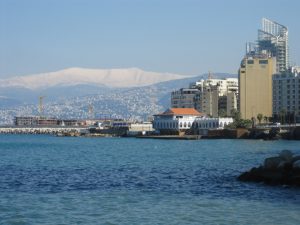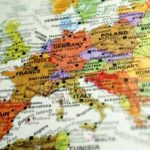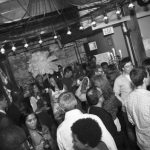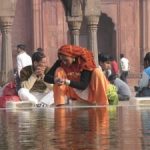You can’t understand the sense of triumph I felt as I crossed the street unless you’ve been to Beirut, a city in which I had been in and out over a two year span. My latest stint was nearing its end and I felt reflective and nostalgic and disappointed that the world has decided where you are allowed to live and work based on the coincidence of your birth. I had resolved to take advantage of a hole in the stormy sky and wander the streets of what felt like home, when the sudden desire to see the sea pushed me to brave the ominous and amble down to the corniche. A lonely patch of blue hovered over me; the Med revealed itself as an apparition as it came into view from behind the derelict walls of the Manara district.
Manara. “Lighthouse.” For me, yes, a beacon. That a city of such chaos can bring clarity to a mind as cluttered with the politics of breathing as mine is something of an apparition as well. The physical lighthouse stands as an ugly pillar at the tip of West Beirut, its stoic concrete a Medusa to approaching ships. This morning the only ships pushing across the sea were two UN patrols sulking across the horizon. I was one of the few who walked past the lighthouse.
On sunny Saturdays the corniche is packed with every flavor of human being manufactured by the universe. Old men who’ve seemingly experienced the entire history of the world stroll nimbly with their hands clacking prayer beads behind their backs. Bored youth hang lazily over the railing, their own hands consuming a more modern devotional object – the mobile phone. Hijab-clad women walk next to uncovered heads pushing strollers and running after small children. Westerners marvel at the fact they are in Beirut, often donning shorts and backpacks and a sense of wondrous curiosity at the impossible place in which they find themselves – mountains, sea, bullet-riddled buildings and shiny skyscrapers and beaten up taxis and glistening Mercedes. Sri Lankans in green Sukleen uniforms stab up garbage, joggers in Adidas suits weave through crowds, and coffee sellers shout “ahwi” to alert the entirety of the promenade to their liquid wares.
Old photographs show a vastly different Beirut than the one I know. The corniche and the road that runs between it and the new highrises were but a rocky shoreline in the late nineteenth century. A few of the old Ottoman buildings still stand but they are losing the battle with construction; many of them have permanently lost their views of the sea to what some people call “development.” The corniche has been afflicted by the erection of these monstrosities, as they block out the sun and cast shadows on those who only wish to enjoy a sunny day seaside. Despite it all, the sea still beckons, and the smell of saltwater cleanses the nose and the soul after the pollution of Beirut the city.
I’ve walked that route far more times than I can count, but each step is a sense of renewal and revelation. I don’t know if I will ever be able to describe what it is that draws me to this place, where there is not 24 hours of electricity, where UN warships patrol the coast, where airplanes land with the sea on one side and Sabra and Chatilla Palestinian refugee camps on the other, and where buildings crumble from war or neglect, but there is a soul to it unmatched by any place I’ve been, a will to survive, a desire for something divinely greater and infinitely more beautiful than the present. These people have been through hell and lived to tell the story of their own apocalypse, the one that lasted fifteen years, the one that put the name Beirut in a thesaurus under the entry for bombs, the one that continues to keep away the tourists. It’s stunning to contemplate what happened in this place, once called “The Paris of the Middle East,” where movie stars like Marlon Brando took vacations and where people thought of beaches and beauty. There is a different kind of beauty now, like an aged star, wrinkled and weary but carrying a twinkle in her eye. There is still a part to play in this world, a lead role, and the corniche is but a line in the script.
And so, I crossed the street from the seaside to the path that would lead me back to my apartment in Hamra with a smile born of amazement, for once I had had to dart across this very street during small gaps in speeding traffic. On this particular day, cars idled as they waited impatiently for something I had always taken for granted: a red traffic light. A lighthouse, indeed.






Thanks for this well written reflective piece – those are some nice mountains behind the city – is there skiing up there?
Yes, there are some good slopes up there with views of the sea. You can actually go skiing and swim at the beach in the same day because March and April can get rather warm along the coast. I’ve never done it, but I do know some people who have. Sadly, though, Lebanon is suffering from the effects of climate change and there isn’t as much snow as there used to be. Some environmentalists I worked with are worried that the ski industry’s days are numbered. As if the country needs any more problems!
This is a powerful story that gives a wonderfully different perspective about a place in the “news” that never seems real or inhabited by actual people. Thanks!